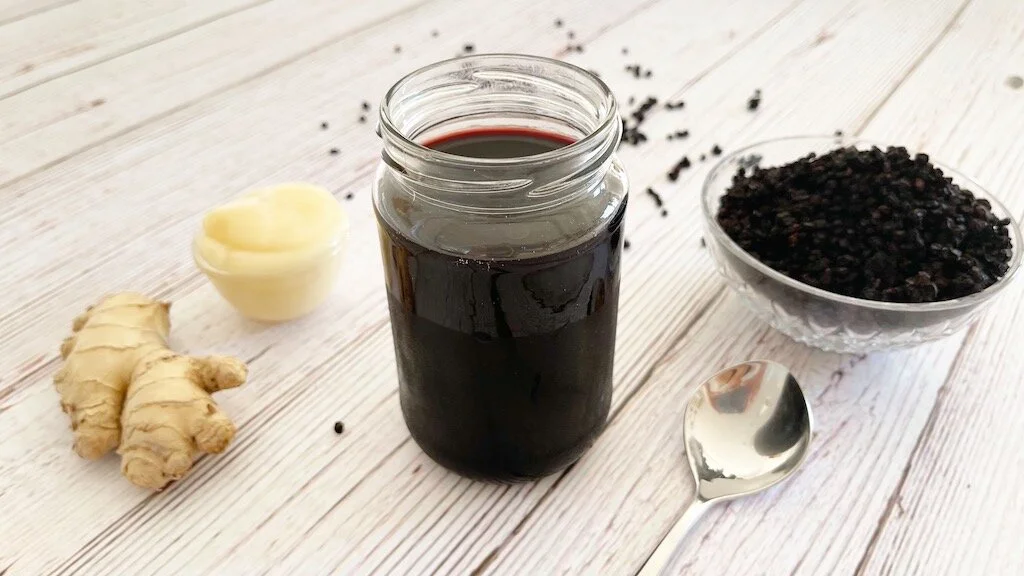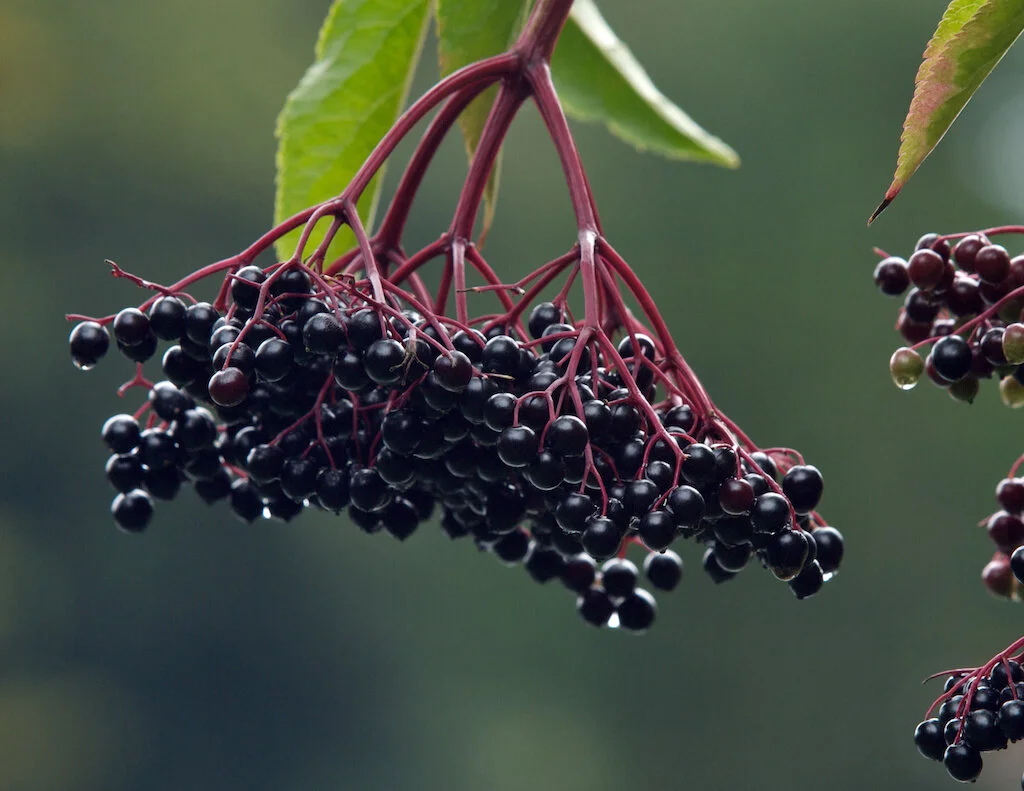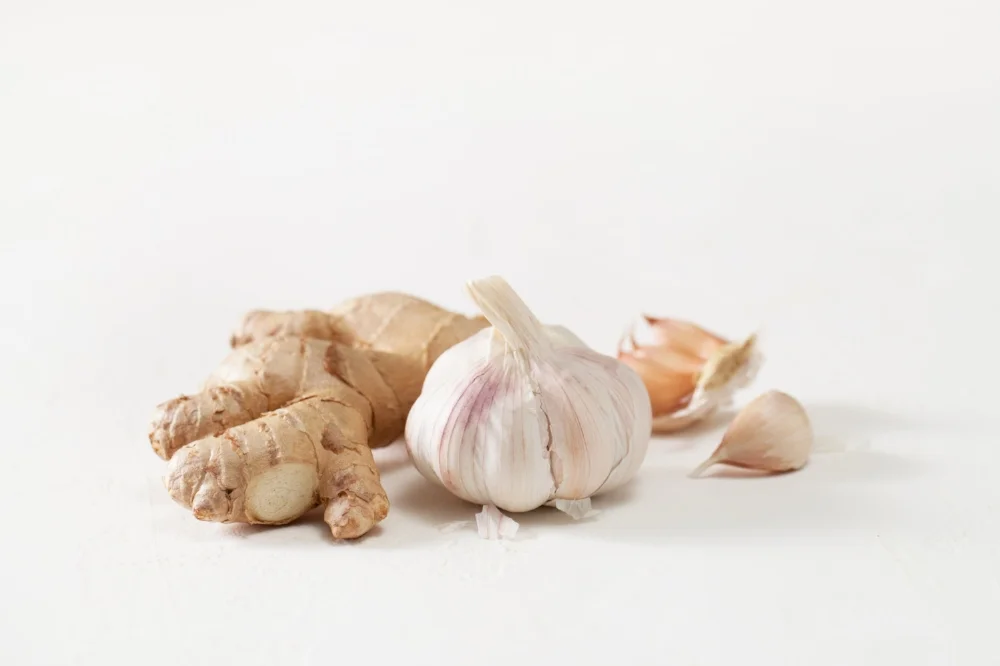Get ready for the sniffles season. Here's the Top 7 Health Benefits of Elderberry Syrup
This post contains affiliate links. You can read about my affiliate policy here.
I came across some dried elderberries in my cupboard, which reminded me that it’s time to prepare for the winters sniffles.
So I found an elderberry syrup recipe at Mountain Rose Herbs and was very surprised how delicious it tastes. And even though I’m only supposed to take 1-2 tsp a day, I have a problem limiting myself to that.
I’m already and elderberry syrup addict.
Elderberries are one of my autumn and winter remedies to help me get through the flu season strong and healthy.
Elderberries are quite special. Read all about it below.
At the bottom of this post you can find a simple and easy recipe to make this tasty elderberry syrup.
What are elderberries?
Elderberries are small, black-purple berries that belong to the Sambus tree, also known as the European elderberry or black Elder.
Sambucus nigra is the full scientific name of the most common variety used for medicinal purposes. Most of the scientific research is also conducted of this sort.
Elderberry is native to Europe, Africa, and parts of Asia and has also become common in the U.S. It has deciduous leaves, white flowers (elderflowers), and the berries turn from green to red to black. You can often find Elder growing in woodlands and hedgerows.
Elderberries and Folk Medicine
My dad used to cook "elderberry soup" (I think that's what he called it) and stuffed it in his family to keep us snot-free during winter.
He was not the inventor of that idea.
It turns out that throughout history, people have used many parts of the elderberry tree for all sorts of medicinal and culinary purposes.
They used the flowers and leaves for pain relief, swelling, inflammation, and to get sweat and pee flowing again.
Elderberry bark was the go-to remedy to get some action going in the bowel area, plus inducing vomiting.
Nowadays, it's trendy to boil the flowers with sugar to make a sweet syrup or to infuse them into tea.
I only have cooking experience with the berry parts.
I use them mainly as syrup for their medicinal purposes and health benefits. Oh, and for the excellent taste.
Try my delicious and simple recipe for elderberry syrup below ↓
7 Health Benefits of Elderberry Syrup
1. Very High Antioxidant Capacity
Elderberry's medicinal potential comes from its antioxidant potential.
The human body is constantly under attack from oxidation and toxins in our environment, such as tobacco smoke, ultraviolet light, etc., and it uses free radicals to protect itself.
The body naturally produces these free radicals that are highly reactive and unstable molecules with a lifespan of only a fraction of a second.
But during that short span, they can damage DNA, sometimes resulting in mutations that can lead to cancer.
Our body uses antioxidants from plants to neutralize harmful free radicals.
Elderberry's total antioxidant capacity is one of the highest of all the small fruits.
Source
The power and strength of an antioxidant product is measured with a value which is known as ORAC.
The ORAC value shows how well fruits, berries, or vegetables are binding to free radicals and neutralizing the free radicals.
By choosing foods with high ORAC values, the stronger the antioxidant effect.
The highest ORAC values are found in cocoa, green tea, dried fruit, dried berries, and, as you can see here ↑, in elderberries.
2. Rich in nutrients
Elderberries are naturally high in vitamin C, vitamin A, vitamin B6, iron, and potassium, among several other essential nutrients.
Elderberries are also one of the most concentrated sources of a flavonoid called anthocyanins, a class of compounds with antioxidant effects and immune-supporting properties.
Anthocyanins are the pigments that give red, purple, and blue plants their rich coloring. In addition to acting as antioxidants and fighting free radicals, anthocyanins may offer anti-inflammatory, antiviral, and anti-cancer benefits.
3. Immune System Supporter & Flu Reliever
One of the most well-studied elderberry syrup benefits is its powerful immune-boosting properties. Most of all because of the anthocyanidins, which are known to have immunostimulant effects.
Several studies support the use of elderberry syrup for flu symptoms. Specifically, the flavonoids in the extract bind to the H1N1 human influenza virus as well as the H5N1 avian influenza virus.
A 2009 study randomized patients into two groups. One group had four doses of 175-milligram proprietary elderberry extract daily, and the other group drank a placebo for two days. The group treated with the extract showed significant improvement in most flu symptoms, while the placebo group showed no improvement in symptom severity. The researchers concluded that the extract is effective in controlling influenza symptoms.
Another study published in the Journal of International Medical Research showed that when you take the extract within the first 48 hours of the onset of flu symptoms, it can shorten the duration of flu symptoms by an average of four days.
The vitamins mentioned above also contribute to immune-boosting properties.
Vitamin A plays a vital role in maintaining your body's natural defenses. This includes the mucous barriers in your eyes, lungs, gut, and genitals which help trap bacteria and other infectious agents.
Vitamin A is also involved in the production and function of white blood cells, which help capture and clear bacteria and other pathogens from the bloodstream. Therefore a deficiency in vitamin A can increase your susceptibility to infections and delay your recovery when you get sick.
Vitamin B6 helps chemical reactions in the immune system work better and guard your body against infections. Studies conducted with older adults have linked low levels of vitamin B6 with poor immune response.
Vitamin C is involved in many parts of the immune system.
It helps several important cells in the immune system (such as T cells) perform their jobs.
It helps encourage the production of white blood cells, which help protect the body against infection.
It helps these white blood cells function more effectively while protecting them from damage by potentially harmful molecules, like the free radicals.
It's an essential part of the skin's defense system. It's actively transported to the skin, where it can act as an antioxidant and help strengthen the skin's barriers and may shorten wound healing time.
4. Respiratory & Sinus Support
With elderberry's anti-inflammatory and antioxidant properties, it makes sense that it can help treat sinus issues. A sinus infection is a condition in which the cavities around the nasal passages become inflamed, and this antiviral herb has promise as a natural sinus infection remedy.
According to The Herbal Apothecary, elderberries support the body's natural process of resolving excess phlegm.
5. Help improve skin
Vitamin C is an essential part of the skin's defense system. It's actively transported to the skin, where it can act as an antioxidant and help strengthen the skin's barriers and may shorten wound healing time.
Elderberry's content of bioflavonoids, antioxidants, and vitamin A makes it excellent for skin health. Not only that, but researchers also suspect that a compound found in the berry could give a natural boost to skin.
Anthocyanin's anti-inflammatory and antioxidant properties may also help improve skin structure and condition to enhance overall skin health.
6. Enhance Heart Health
Given that they are rich in potassium (and have great potassium to sodium ratio), elderberries can help regulate blood pressure. They ensure the blood vessels relax. Also, a high potassium diet is known to reduce the strain on the heart. Studies have shown that individuals taking a high amount of potassium (- and by this, I don't mean excess) had a 49 percent less risk of death by ischemic heart disease.
Some sources also say that elderberries can help regulate cholesterol levels and even boost circulation (and this offers good exercise to the heart and keeps it in shape).
The amazing anthocyanins come into play here also. They protect the inner layer of the blood vessels from oxidative stress. This protects the cells from inflammatory stressors, ultimately improving circulation and cutting the risk of heart disease.
7. Mood boost & brain health
Because elderberries are naturally high in vitamin B6 and antioxidants, they are also excellent brain food.
The brain cannot produce neurotransmitters ("happy chemicals") that regulate emotions, including serotonin, dopamine, and gamma-aminobutyric acid (GABA), without vitamin B6.
Vitamin B6 may also play a role in decreasing high blood levels of the amino acid homocysteine, which have been linked to depression and other psychiatric issues.
Loading up with antioxidants is essential for brain health. Because of all bodily organs, the brain is the one that suffers most from oxidative stress. Free radicals incessantly develop, thought by thought, making their way through our neurons like little tornados. The more free radicals your brain contains, the more damage done.
Elderberry Syrup Recipe
With a very little time investment, you can make this beautiful elderberry syrup.
Note that this recipe is "refrigerator stable” because it’s made with honey.
If you want to make a shelf-stable syrup (i.e., one you can keep at room temperature), you'll need to add extra sugar or alcohol to keep it mold and bad bacteria-free.
Makes about 3 cups of syrup
Active Time: 45 min.
Total time incl. steep time: 1 hour 45 min.
Props
A pot* (Use a ceramic, glass, or another non-reactive pot that won't off-gas. Avoid pots with synthetic nonstick coatings).
Cheesecloth (double layer), undyed muslin, or check your local fabric store for rolls of undyed muslin.
Ingredients
2 cups dried organic elderberries
4 cups cold water (distilled, purified, or spring water works best)
2-3 tsp. organic dried ginger root
1 organic sweet cinnamon stick
1 cup raw, local honey (or organic maple syrup or agave for a vegan/infant-friendly recipe); double the amount of sweetener to increase shelf life
About the ingredients
Elderberries. You can use fresh or dry elderberries. The dry ones are easier to find all year. So that's what I use.
Honey. Honey is best for sniffles and very soothing for the throat. Raw honey is the most nutritious. Add the raw honey after the syrup has cooled to keep the good stuff.
Important: Honey is not safe for children under 1-year-old. If you're planning to share your syrup with a very little one, you would need to substitute either sugar or maple syrup for the honey.
Using honey as a preservative makes the syrup only "refrigerator stable." If you want to make a shelf-stable syrup (i.e., one you can keep at room temperature), you'll need to add extra sugar or alcohol to keep it mold and bad bacteria-free.
Ginger has a warming effect. When you feel like you're getting under the weather, ginger has this dispersing quality, which is very lovely in a syrup.
Water. Remember that your finished herbal product is only as good as what you start with. The ingredients matter - that includes water. The water should be clean, filtered water, or good spring water.
Cinnamon contains antioxidants with anti-inflammatory effects.
The distinctive smell and flavor of cinnamon come from the essential oils contained in the bark, called cinnamaldehyde. Cinnamaldehyde displays antiviral, anti-bacterial, and anti-fungal properties.
This is your basics for making syrups
Use 1 ounce of elderberries for every 4 ounces of water.
Simmer 30 min.
Steep one hour
Strain
Add 50% honey
Here's your step by step guide
Combine berries and herbs with cold water in a pot.
Let it come to a boil.
Turn down the heat.
Let simmer for 30 minutes with the lid on (keep an eye on it).
Turn the heat off and let it steep for one hour. The longer it simmers and steeps, the more you pull the good stuff into the water.
Strain your syrup into a jar. It's probably still pretty hot so if you want to squeeze, make sure you wear gloves (or leave the lid off for half an hour prior).
Measure how much liquid you have. If you have 16 ounces of finished syrup, you add 8 ounces of honey (or sugar or maple syrup)
If using raw honey, cool the syrup to almost room temperature to keep all the good natural enzymes in the honey - under 38°C / 100 °F.
Stir gently to combine
Put a sticker on your jar with the name ("elderberry syrup") and date on it.
Keep it in the fridge.
Enjoy one or two teaspoons a day straight out of the fridge as a daily nourishing beverage to take you through the sniffle season and the long winter months.
Related posts…
Dislaimer:
All information in this blog is strictly for informational purposes only and should not be taken as medical advice. The statements made in this blog have not been evaluated by The Danish Health Authority. The products linked to in this book and any information published on this blog are not intended to diagnose, treat, cure, or prevent any disease. The information provided by this blog is not a substitute for a faceto-face consultation with your physician, and should not be construed as medical advice. The entire contents of this blog are based upon the opinions of Hanne Robinson. By reading and using this blog, you agree to only use this publication for personal informational use and not as a substitute for medical or other professional advice.








